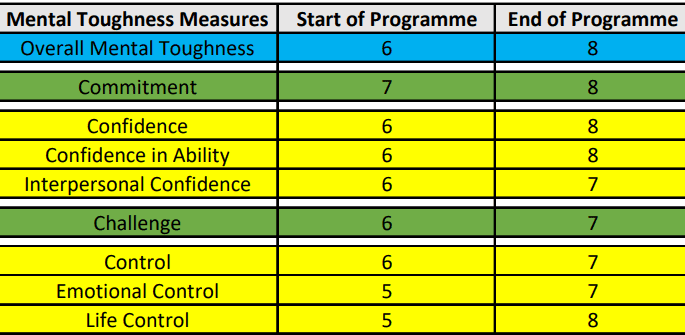
Sports Psychology Tips: Is Sports Psychology Measureable?
Many people don't recognise that Sports Psychology can be measured in many ways...
Sports psychology coaching is regarded by some as touchy/feely or pink and fluffy. For instance, I’d be a very rich man the number of times I’ve heard the line, “You’re the guy who does the positive thinking stuff, ha, ha”.
Sadly, assumptions like this put a lot of people off receiving support which mean they drift along doing the same things time and time again, and go on to repeat the same mistakes. I’ve seen this so many times in sport, and it is a huge reason why so many people get disillusioned, give up easily and fail to attack big, and seemingly out of reach goals! Is this familiar?
The sports psychology coaching process is a very effective way of initiating change, developing people professionally and personally, as well as, hugely importantly delivering results. Certainly, in my practice wherever possible I try to ensure clients can measure their progress, so that they can see that their investment was worthwhile at an individual and organisational level. Also, for many individuals, having targets and being able to see tangible progress is a great way to enhance their motivation and confidence too.
Below is a list of some of the tools that I utilise in my practise to ensure we can measure your progress and you go on to achieve your goals.
Measure: Psychometric MTQ Plus or MTQ48 Questionnaire measures Overall Mental Toughness and the 4’C’s: Commitment, Challenge, Confidence and Control.
How Used: 1 – / During / End of Coaching Programme for individuals.
How Used: 2 – During / End of Coaching Programme – Team/Organisational wide so return on investment can be measured and wider cultural factors can be addressed.
Below is an image of some Mental Toughness measures from the MTQ48 highlighted in a previous post. In addition for a sample of a MTQ Plus Developmental or Coaching Report please get in touch.

Measure: Tailored Questionnaires are devised that are specific to agreed KPI’s such as trust, team cohesion, team energy etc.
How Used: Club, Team or Organisational wide so return on investment can be measured and wider cultural factors can be addressed.
Measure: Heartmath, Inner Balance feature. Coherence is a measure of the patterns in the heart’s rhythm. It reflects an orderly and harmonious synchronization among various systems in the body such as the heart, respiratory system and blood-pressure rhythms,
How Used: In individual and group programmes to boost focus, concentration and well-being. Utilised in training, homelife and during challenging tasks.
Measure: Heart Rate Monitor
How Used: To measure heart rate in a training and actual environment to see how individuals respond to stress at an individual and/or team level.
In addition to this list a critical part of the coaching process is to help you set outcome, performance and process goals which when done properly with an expert can really help you focus on what is important and provide a real sense of purpose.
If you would like to discuss how sports psychology coaching could help you please feel free get in touch.
Or if you found this article helpful, please share it with your friends, team-mates, parents or coaches. You can also join our community – THE SPORTS PSYCHOLOGY HUB – for regular Sports Psychology tips, podcasts, motivation and support.

Best Wishes
David Charlton
Global Sports Psychologist who is located near Newcastle Upon Tyne, UK and willing to travel Internationally. David also uses online video conferencing software (Zoom, Facetime, WhatsApp) on a regular basis and has clients who he has supported in USA, Canada, South America, UAE, Australian and New Zealand.
Managing Director – Inspiring Sporting Excellence and Founder of The Sports Psychology Hub. With over 10 years experience supporting athletes, coaches, parents and teams to achieve their goals, quickly.
Emotional Control for Coaches: Replace Outcome Talk with Process Cues
Emotional Control & “Fear Phrases” in Youth Sport A Guide For Sport Coaches How to keep standards high without creating a fear-based culture Youth sport coaches don’t just coach skills you coach “psychological states”. Your tone, language and body language shape how children and young athletes interpret pressure. When emotions run high, many coaches slip
Why Some Kids Believe They Can and Others Don’t
Conversations with Kids: Why Some Kids Believe They Can and Others Don’t For parents and guardians where we give you prompts so that you can have more meaningful conversations with your children to help them build key characteristics such as mental toughness, resilience, confidence, creativity, focus and so on. A Questions for Your Kids When
Why Mentally Tough Kids Make Better Decisions Under Pressure
Why 12–16 Is A Very Important Age for Mental Toughness Lessons From Doug Strycharczyk If you coach children aged 12–16, you’ll know something important: their skills are improving fast, but their minds can be over the place. One week they look confident, brave and creative. The next week they freeze, hide or panic under pressure.
Helping Young Athletes Handle Exam Pressure Without Burning Out
Conversations with Kids: When School and Sport Collide For parents and guardians where we give you prompts so that you can have more meaningful conversations with your children to help them build key characteristics such as mental toughness, resilience, confidence, creativity, focus and so on. A Questions for Your Kids “When schoolwork, exams, and sport
Mental Toughness in Youth Sport: Words of Wisdom Every Sport Coach Needs to Hear
Mental Toughness in Youth Sport: Words of Wisdom Every Sport Coach Needs to Hear Coaching teenagers and young athletes has never been more complex. This is the stage where talent begins to separate, expectations increase, selection pressure intensifies, and confidence can fluctuate wildly from week to week. Many young athletes look physically capable but are

